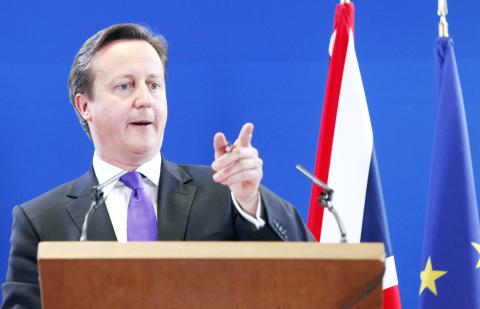British Prime Minister David Cameron has raised the prospect of a possible referendum on Britain’s future relationship with the EU, potentially threatening trade with the bloc and opening up another front against the Conservatives’ coalition partner.
Britain has had a long and painful history of infighting and changes of heart over how closely to integrate with the EU ever since it joined its precursor four decades ago.
Fears over closer fiscal union in the single currency bloc in response to the eurozone debt crisis has heightened concerns among backbenchers, especially among the eurosceptics on the right of the Conservative Party and the electorate.

Photo: Reuters
Polls suggest that if given a chance, voters would opt out of the EU.
Cameron, writing in the Sunday Telegraph, said he believed the “vast majority of the British people,” like him, wanted to make changes to Britain’s current relationship.
He wrote that for those outside the eurozone, “far from there being too little Europe, there is too much of it” in terms of bureaucracy. The question was how to get the relationship right.
“As we get closer to the end point, we will need to consider how best to get the full-hearted support of the British people whether it is in a general election or in a referendum,” he wrote.
“As I have said, for me the two words ‘Europe’ and ‘referendum’ can go together, particularly if we really are proposing a change in how our country is governed, but let us get the people a real choice first,” he added.
A significant reason for holding back on a referendum is concerns surrounding the economic consequences of an exit from the free-trade bloc, Britain’s biggest export market.
Also, the junior partner in the coalition, the Liberal Democrats, are pro-Europe, and the two parties have already had their differences over key policies.
“Tactical and strategic patience” would need to be shown, the prime minister said.
Commentators suggested Cameron might use a referendum as an election fillip, ahead of the next parliamentary vote in 2015, especially after his party’s popularity took a knock after a budget in March.
The main opposition Labour Party has been debating about whether to hold a referendum around the time of the election.
An added pressure on Cameron has been the anti-EU UK Independence Party, which has grown in influence, doing well in local elections in May on a ticket of total withdrawal from the EU.
In the article, Cameron wrote: “As a trading nation Britain needs unfettered access to European markets and a say in how the rules of that market are written.”
“The single market is at the heart of the case for staying in the EU,” he added.
“I don’t agree with those who say we should leave and therefore want the earliest possible in/out referendum. Leaving would not be in our country’s best interests,” he wrote.

‘SWASTICAR’: Tesla CEO Elon Musk’s close association with Donald Trump has prompted opponents to brand him a ‘Nazi’ and resulted in a dramatic drop in sales Demonstrators descended on Tesla Inc dealerships across the US, and in Europe and Canada on Saturday to protest company chief Elon Musk, who has amassed extraordinary power as a top adviser to US President Donald Trump. Waving signs with messages such as “Musk is stealing our money” and “Reclaim our country,” the protests largely took place peacefully following fiery episodes of vandalism on Tesla vehicles, dealerships and other facilities in recent weeks that US officials have denounced as terrorism. Hundreds rallied on Saturday outside the Tesla dealership in Manhattan. Some blasted Musk, the world’s richest man, while others demanded the shuttering of his

ADVERSARIES: The new list includes 11 entities in China and one in Taiwan, which is a local branch of Chinese cloud computing firm Inspur Group The US added dozens of entities to a trade blacklist on Tuesday, the US Department of Commerce said, in part to disrupt Beijing’s artificial intelligence (AI) and advanced computing capabilities. The action affects 80 entities from countries including China, the United Arab Emirates and Iran, with the commerce department citing their “activities contrary to US national security and foreign policy.” Those added to the “entity list” are restricted from obtaining US items and technologies without government authorization. “We will not allow adversaries to exploit American technology to bolster their own militaries and threaten American lives,” US Secretary of Commerce Howard Lutnick said. The entities

Minister of Finance Chuang Tsui-yun (莊翠雲) yesterday told lawmakers that she “would not speculate,” but a “response plan” has been prepared in case Taiwan is targeted by US President Donald Trump’s reciprocal tariffs, which are to be announced on Wednesday next week. The Trump administration, including US Secretary of the Treasury Scott Bessent, has said that much of the proposed reciprocal tariffs would focus on the 15 countries that have the highest trade surpluses with the US. Bessent has referred to those countries as the “dirty 15,” but has not named them. Last year, Taiwan’s US$73.9 billion trade surplus with the US

Prices of gasoline and diesel products at domestic gas stations are to fall NT$0.2 and NT$0.1 per liter respectively this week, even though international crude oil prices rose last week, CPC Corp, Taiwan (台灣中油) and Formosa Petrochemical Corp (台塑石化) said yesterday. International crude oil prices continued rising last week, as the US Energy Information Administration reported a larger-than-expected drop in US commercial crude oil inventories, CPC said in a statement. Based on the company’s floating oil price formula, the cost of crude oil rose 2.38 percent last week from a week earlier, it said. News that US President Donald Trump plans a “secondary